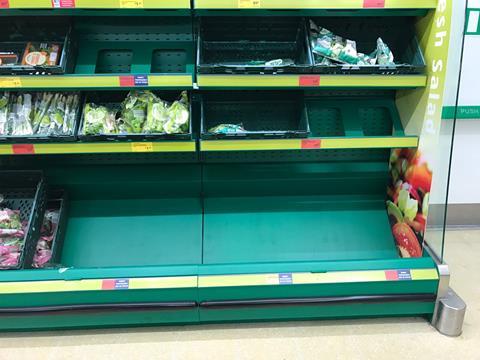Government food tsar and restaurateur Henry Dimbleby tells BBC Today programme that supermarket culture – not weather – is to blame for produce shortages in UK

Fixed-price contracts between British supermarkets and their suppliers are to blame for the empty vegetable shelves across UK stores, according to restaurateur and government adviser on food Henry Dimbleby.
Speaking on the Today programme this morning (6 March), Dimbleby said supermarket buying practices artificially keep fresh produce prices down in the UK, which means, when there is a crop shortage, not only do European suppliers not want to sell to the UK, but local restaurateurs and market stall holders bulk-buy from supermarkets rather than wholesalers because it is cheaper, which leads to empty shelves and rationing.
“The weather [in Spain] was the starting point [for recent shortages], but why does Europe have veg on its shelves and we didn’t? It’s the supermarket contracts plus the supermarket culture [that when there are shortages, supermarkets refuse to raise their prices].
”In the UK, an iceberg lettuce costs 70p. In Europe it is £1.50. Peppers are three times the price. This also works the other way. In the summer when there was a glut of iceberg, supermarkets refuse to lower the prices so farmers can’t sell their gluts, and farmers have to dig product in the ground.”
Dimbleby said fresh produce shortages in the UK will become a more common occurrence in future due to climate change and because investment in horticulture in the UK is much lower than in Europe.
While he conceded that keeping produce prices down was favourable from a UK consumer perspective, he argued that it was unsustainable.
“It is not sustainable from a food poverty perspective to create a planned economy in one of most volatile sectors in economy,” he said. “[Supermarkets] are effectively subsidising poverty by destroying a sector of our economy.”
Andrew Opie, director of food and sustainability at the British Retail Consortium (BRC) disagreed with Dimbleby on the issue of supermarket contracts.
“Consumers’ household incomes are being squeezed all over, so supermarkets are working with suppliers to keep prices down. Consumers wouldn’t welcome paying double for iceberg lettuce or cucumber,” he said. “Supermarkets are trying to find a balance between suppliers and consumers.
“Absolutely I think this is sustainable. I don’t buy the argument that supermarkets aren’t willing to adjust prices or listen to suppliers. Supermarkets are pragmatists and we have seen very frequent negotiations with suppliers particularly in fresh produce sector.”
Dimbleby added that the UK has a completely different retail market structure than Europe, partly due to the lack of grower cooperatives who have considerable bargaining power in Europe.
Opie agreed: “Europe has regulations that constrain retailers. In the UK we have free market. Supermarkets here have a laser-like focus on consumers and how to keep prices down. But supermarkets are pragmatists: they know they have to invest in their suppliers.”



